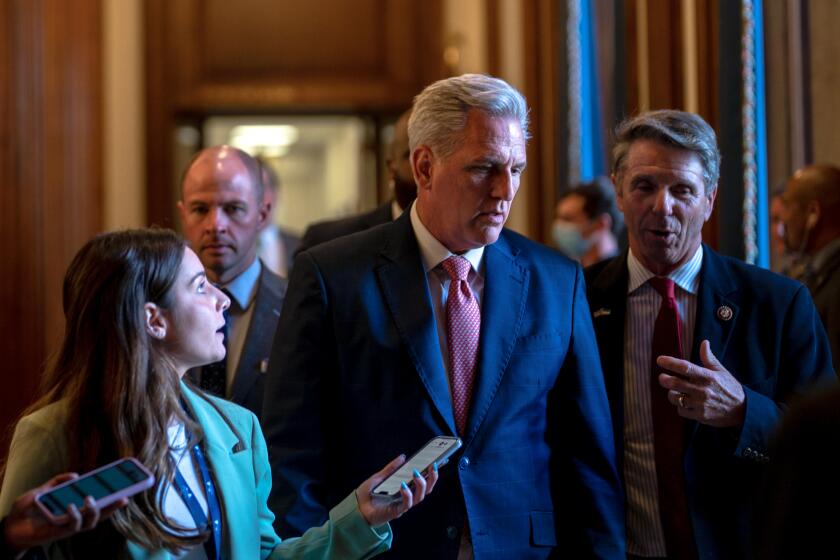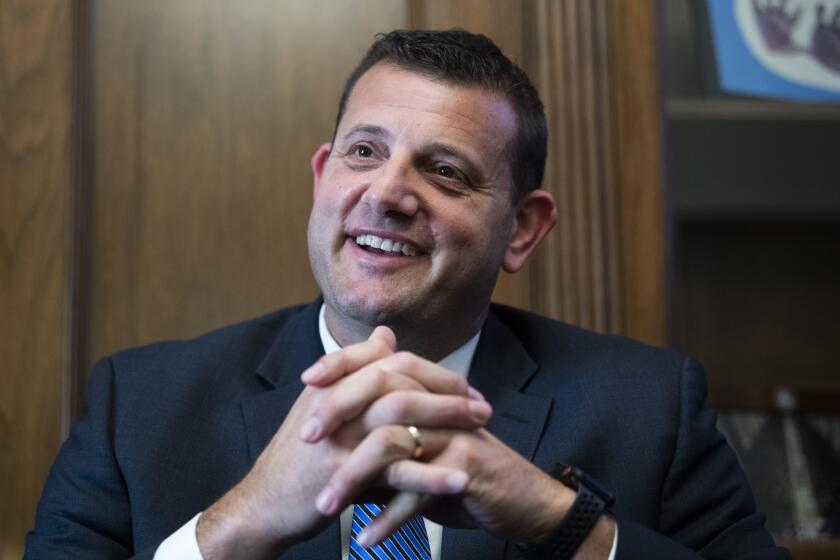California races that will shape control of Congress come into focus after primary

California contests that will shape control of Congress came into focus Tuesday evening in the midterm primary, with one of the nation’s most endangered Republican incumbents, Rep. Mike Garcia, moving forward to face off for the third time against former Assemblywoman Christy Smith in northern Los Angeles County.
GOP Rep. Michelle Steel will continue an increasingly personal battle with Democrat Jay Chen, a Navy Reserve intelligence officer, in a competitive Orange County district with a plurality of Asian American voters. And Democratic Rep. Katie Porter, also drawn into a tight district in the same county, will face off with a former GOP state legislator.
These are three of several congressional contests in the state that are being closely watched by political observers around the nation as Republicans attempt to retake control of Congress.
“California is going to be the only reason Democrats have any chance of holding the House,” said Brandon Zavala, Smith’s campaign manager in two 2020 races. “It is clear there is no path to holding the House or even keeping a slim minority if we can’t pick up some of these California seats.”
With California’s primary over, the focus turns to the state’s role in the battle for control of the House of Representatives in the general election.
Several other competitive races had not been called late Tuesday night.
In the top federal contest on the ballot, Sen. Alex Padilla, who was appointed to the post after Kamala Harris became vice president, easily won a spot on the November ballot.
“I’m honored to have received the support of so many California voters from all areas of the state in my campaign for Senate. I thank every voter who cast their ballot in this election and every election worker who helped administer another successful election,” the Porter Ranch Democrat, a former Los Angeles and state elected official, said in a statement Tuesday night. “I’m humbled and excited to continue delivering for California and earning the support of California voters again in November.”
Padilla was on the ballot twice — once in a special election to fill the remainder of Harris’ term through early 2023 and in the primary to run for a full six-year term. He advanced in both for the general election in November. Republican attorney Mark Meuser, whom Padilla overwhelmingly defeated in the 2018 secretary of state’s race, also advanced to the general election in both contests.
Meuser said he was confident his message would resonate with Californians of all parties.
“It’s been 10 years since a Republican candidate has made it to the November election in the U.S. Senate race. That was very important to me to actually on Day One fight a campaign to make sure that I got the Republican vote consolidated,” Meuser said. “Now that we’ve done that, it’s important to reach out to all the voters of the state of California talking about the important issues of inflation, energy and what’s going on in our schools and what’s going on with crime.”
California’s congressional matchups in November could usher in a number of changes to the state’s 52-member House delegation, the largest in the nation. The races will reverberate nationally, as Democrats look to the state as a buffer against expected congressional losses and Republicans seek to pad their margins if they successfully take the House.
Under California’s primary system, the top two vote-getters move on to the November general election regardless of party. Vote counting could take weeks to decide close races, with ballots that were mailed by Tuesday accepted until June 14. There are several contests that political observers around the nation are watching closely, in part because of the once-a-decade redrawing of congressional districts that follows the census.
Rep. David Valadao (R-Hanford) infuriated Central Valley conservatives when he voted to impeach Trump. But Trump is silent on Valadao’s reelection bid.
Democrats — facing headwinds because of President Biden’s low approval ratings, inflation and historical voter trends — view three GOP-held seats in the state as among their best pickup opportunities across the country.
Republican Garcia, a former fighter pilot, beat Smith in a special election in 2020, then defeated her again, by 333 votes, in the regular election later that year. The onetime conservative district had been trending more liberal in recent years as demographics changed, and after redistricting, Democrats now have a nearly 12-percentage-point voter registration advantage. Democrat John Quaye Quartey, a combat veteran and novice politician who is a newcomer to the district, had tried to pick up the second spot in the general.
Results are still pending in a marquee Central Valley congressional race. Democrats have a substantial registration edge in GOP Rep. David Valadao’s district, but he’s navigated the political terrain before. This year, however, the Hanford Republican faced two competitors from his right, reflecting anger in the GOP base over his vote to impeach former President Trump.
The race between Rep. Michelle Steel and Jay Chen in a congressional district drawn to empower Asian Americans now features charges of racism, sexism and red-baiting.
Trump hasn’t spoken out publicly against Valadao, setting the congressman apart from the nine other House Republicans who voted for impeachment. That made it difficult for his GOP challengers — Chris Mathys and Adam Medeiros — to consolidate support. A late effort from a Democratic outside group sought to elevate Mathys, which led a super PAC aligned with House Republican leader Kevin McCarthy to respond with attack ads against him. Democratic Assemblyman Rudy Salas of Bakersfield scooped up enough votes from the district’s more liberal voters to advance to the runoff.
When redistricting moved Rep. Steel’s Seal Beach home into Democratic Rep. Katie Porter’s district, the Republican opted not to face the prodigious fundraiser. Steel, a Korean American immigrant, ran instead in a new district that is less favorable for Republicans but contains many Asian American voters. She and Democrat Chen, the son of Taiwanese immigrants, will continue their heated battle into November.
In Porter’s newly drawn district, which includes much of the Orange County coast, Democrats now have only a 1-percentage-point voter registration edge. Biden won among voters in the new district by 11% in 2020, and they also opposed the recall of Gov. Gavin Newsom last year. Porter, an Irvine attorney and law professor who has become a favorite among Democrats nationally, is far better known than her likely GOP rival.
Porter will face off with attorney Scott Baugh, a former state assemblyman and chair of the Orange County GOP. Though Porter has swamped Baugh in fundraising, he has raised seven figures because of his long-standing ties with the county’s wealthy donors.
Two-term Democratic Rep. Mike Levin won a spot on the November ballot and is waiting to see which of several Republican challengers he will face in November. The district straddling Orange and San Diego counties has a 2-percentage-point Democratic advantage, making it a possible pickup opportunity for the GOP. But that could still be a reach for Republicans; voters in the district backed Biden over Trump by 11 percentage points in the 2020 election. The top GOP contenders are former San Juan Capistrano Mayor Brian Maryott, Orange County Supervisor Lisa Bartlett and Oceanside City Councilman Christopher Rodriguez.
Rick Caruso’s rise and Chesa Boudin’s downfall in California’s primary election Tuesday owe much to the power of campaign cash.
Republican Rep. Young Kim appeared to be in solid political position in her new, redder district located largely in inland Orange County. But she and allies ended up spending more than $2 million to fend off an upset by fellow Republican Greg Raths, a Mission Viejo city councilman who campaigned to her right.
Asif Mahmood, a physician and former candidate for insurance commissioner, is the sole Democrat on the ballot. The race has not yet been called. If Kim and Mahmood advance to the general election, the district would likely be easier for Republicans to retain. In fact, Mahmood advertised about Raths in the primary in an attempt to raise his profile.
The musical chairs that followed redistricting, retirements and elected officials seeking other opportunities created a number of open seats.
Two incumbents decided not to seek reelection after they were both drawn into a new, overwhelmingly Democratic, Latino-majority district that stretches from southeast L.A. cities down to Long Beach.
More on the primary
Long Beach Mayor Robert Garcia and Assemblywoman Cristina Garcia are the top Democrats running to represent this area. Robert Garcia had a significant edge in fundraising and endorsements. His campaign appeared to try to elevate the primary profile of Republican John Briscoe, a school district trustee and perennial candidate.
In Los Angeles, Rep. Karen Bass decided to run for mayor rather than seek reelection in one of three California congressional districts represented by Black politicians. State Sen. Sydney Kamlager and former Los Angeles City Councilwoman Jan Perry are among several candidates vying to replace her. The race has not been called, but the district, which includes South Los Angeles, Leimert Park, Ladera Heights and part of Culver City, is almost certain to remain in Democratic hands; the party has a 59-percentage-point voter registration edge in the district.
In the Central Valley, former GOP legislative leader Connie Conway prevailed over Lourin Hubbard, a Democratic water resource manager, in a special election runoff to fill the remainder of former Rep. Devin Nunes’ term. (Nunes left Congress to head Trump’s new social media company.)
In an expansive Republican-leaning open district that includes South Lake Tahoe and Death Valley, Democrat Kermit Jones, a physician and Navy veteran, will compete on the November ballot with Republican Assemblyman Kevin Kiley. Kiley, who came in sixth place among the Republicans who sought to replace Gov. Gavin Newsom in the unsuccessful recall effort, was endorsed by Trump.
More to Read
Get the L.A. Times Politics newsletter
Deeply reported insights into legislation, politics and policy from Sacramento, Washington and beyond. In your inbox three times per week.
You may occasionally receive promotional content from the Los Angeles Times.
















